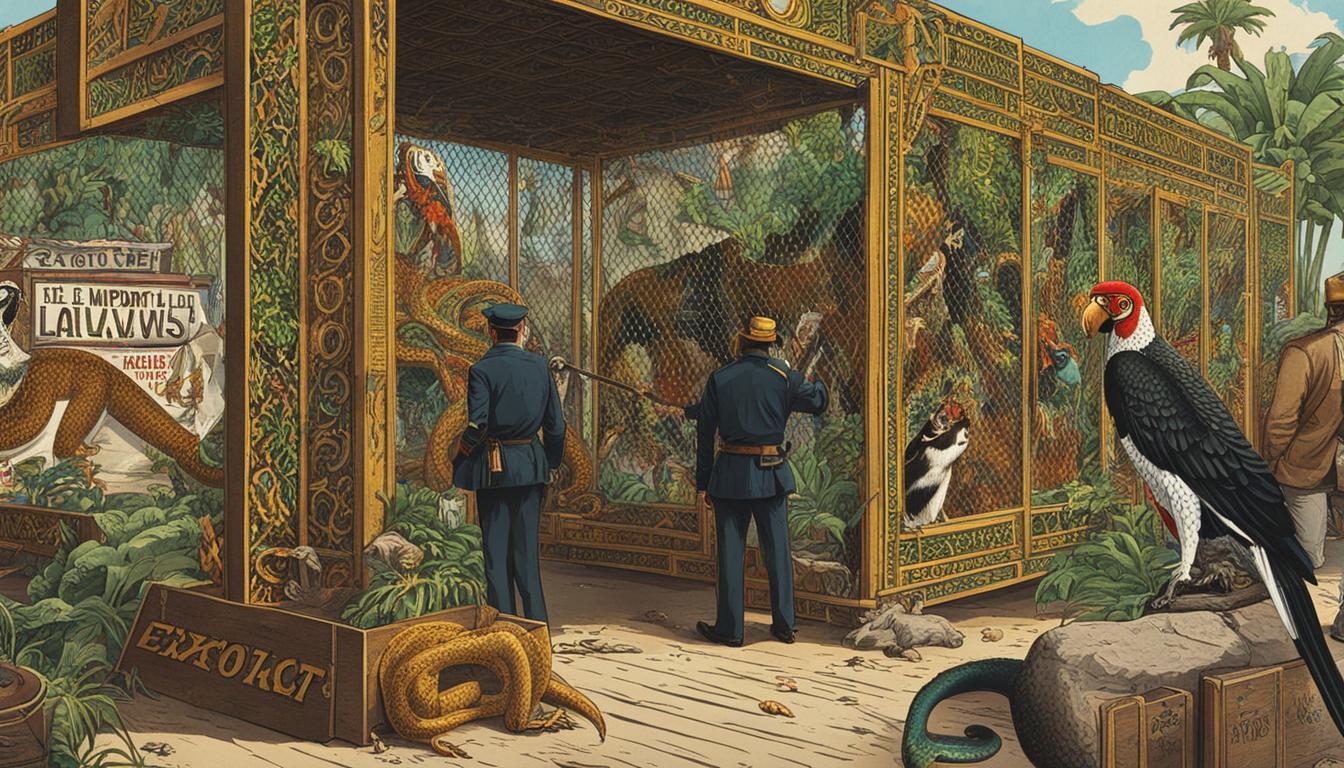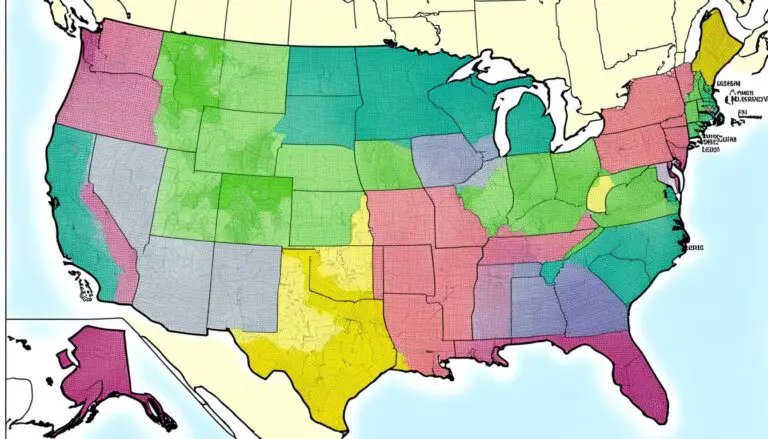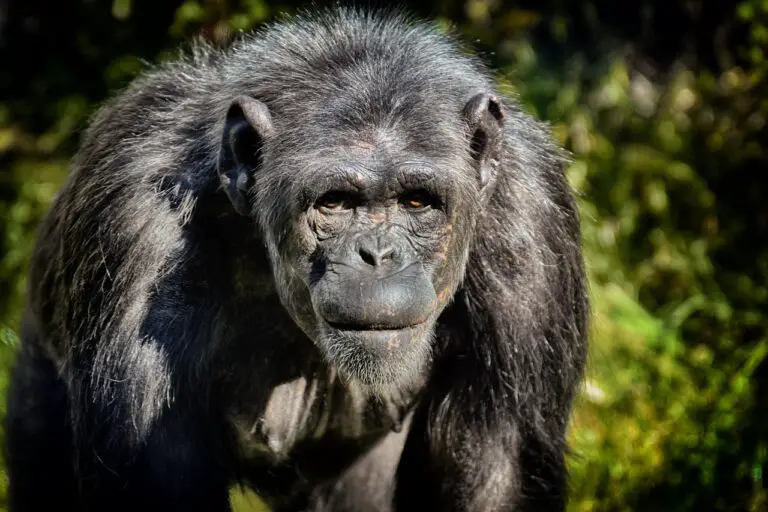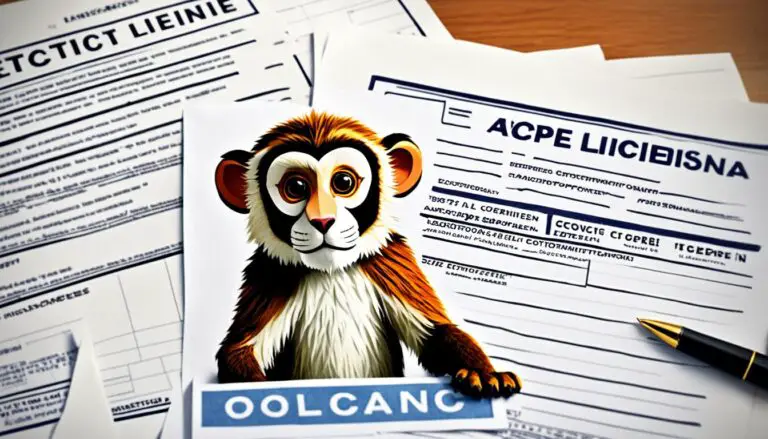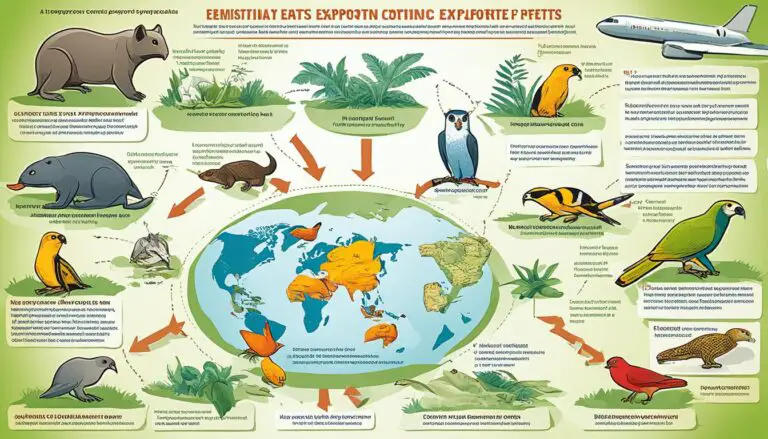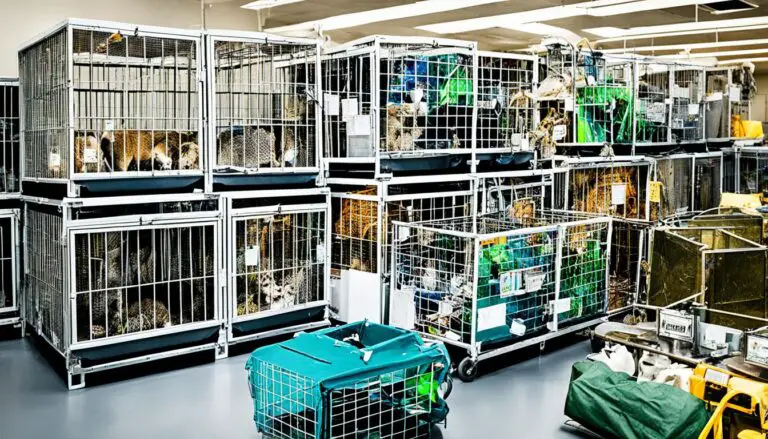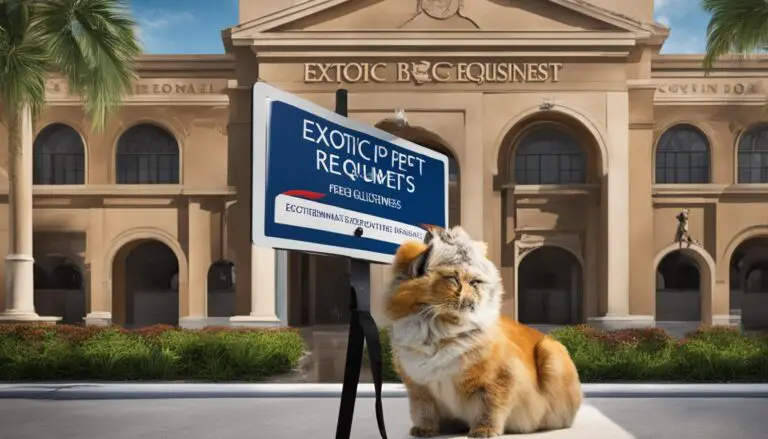Understanding Exotic Pet Import Laws in the US
When it comes to traveling with your exotic pet, it’s important to be aware of the laws and regulations surrounding their importation. Different levels of government, from local to federal, have specific guidelines and requirements for bringing exotic pets into the country. Failure to comply with these laws can result in penalties or the confiscation of your pet.
Before embarking on any interstate or international travel with your exotic pet, it’s crucial to plan ahead and ensure you are aware of the legal requirements. This includes checking with your state wildlife management agency to determine if your pet requires a permit for ownership, possession, and transportation.
Additionally, if you are traveling internationally, you must comply with the import requirements of the destination country. It’s also advisable to consult the International Pet and Animal Transportation Association for assistance with international travel.
By taking the time to understand and adhere to the import laws and regulations, you can ensure a smooth and legal journey for you and your exotic pet.
Key Takeaways:
- Exotic pet import laws in the US vary at the local, state, federal, and international levels.
- Check with your state wildlife management agency to determine if your exotic pet requires a permit.
- Comply with the import requirements of the destination country when traveling internationally.
- Consult the International Pet and Animal Transportation Association for assistance with international travel.
- Understanding and complying with import laws and regulations ensures a smooth and legal journey for you and your exotic pet.
Requirements for Transporting Exotic Pets by Public Air, Rail, Bus, or Boat
If you’re planning to transport your exotic pet by public air, rail, bus, or boat, it’s important to be aware of the specific carrier line requirements. Each carrier may have their own guidelines and restrictions in place for transporting exotic pets, ensuring the safety and well-being of both the animals and passengers.
When preparing for your pet’s journey, make sure to contact the carrier line you’ll be using and inquire about their specific guidelines. This will help you understand any specific documentation, crate size, or other requirements that need to be met.
Remember, compliance with these guidelines is crucial to ensure a smooth and legal transportation experience for your exotic pet.
Whether you’re taking your pet on a cross-country trip or traveling internationally, it’s always a good idea to familiarize yourself with the carrier’s policies beforehand. This can help prevent any last-minute surprises or complications, and ensure a comfortable and stress-free journey for your beloved companion.
Interstate Travel with Exotic Pets
When embarking on interstate travel within the United States with your beloved exotic pet, it is essential to be well-informed about the destination’s requirements and regulations. Ensuring compliance with these rules not only ensures a hassle-free journey but also guarantees the health and safety of your exotic companion.
To equip yourself with the necessary knowledge, the first step is to determine the specific requirements of your destination. The United States Department of Agriculture (USDA) provides a valuable resource in the form of the State Regulations for Importing Animals webpage. This resource allows you to access state-specific information regarding the transport of exotic pets, ensuring you are well-prepared and aware of any necessary permits or documentation.
In addition to checking with the USDA, it is also vital to obtain the contact information of the animal health authority for your destination location. This will enable you to address any specific concerns or questions you may have regarding the transportation of your exotic pet. The animal health authority will provide you with the necessary guidance to ensure compliance with all relevant regulations.
Furthermore, if your exotic pet falls under the category of captive wildlife, such as a flying squirrel or bobcat, you must reach out to both your state’s wildlife management agency and the agency in the destination state. These agencies will provide indispensable information regarding legal ownership and transportation requirements for your specific exotic species.
Animal Health Authority Contacts
| State | Contact Information |
|---|---|
| California | Department of Public Health Phone: (916) 558-1784 Email: exoticanimalpermit@cdph.ca.gov |
| Florida | Florida Fish and Wildlife Commission Phone: (850) 488-6253 Email: wildlife@myfwc.com |
| Texas | Texas Parks and Wildlife Department Phone: (800) 792-1112 Email: exotic.species@tpwd.texas.gov |
State Wildlife Management Agency Contacts
| State | Contact Information |
|---|---|
| California | California Department of Fish and Wildlife Phone: (916) 445-0411 Email: info@wildlife.ca.gov |
| Florida | Florida Fish and Wildlife Commission Phone: (850) 488-6253 Email: wildlife@myfwc.com |
| Texas | Texas Parks and Wildlife Department Phone: (800) 792-1112 Email: exotic.species@tpwd.texas.gov |
By adhering to the requirements of your destination, seeking guidance from the animal health authority, and consulting the state wildlife management agencies, you can ensure a smooth and legal journey for you and your exotic pet.

International Travel with Exotic Pets (Exporting and Importing)
For those planning international travel with their exotic pets, whether exporting them from the United States or importing them into the country, it is crucial to gather the necessary information and comply with the regulations in place. To ensure a smooth process, several key considerations must be taken into account.
Consulate or Embassy Contact Information
When exporting your exotic pet from the US, it is advisable to contact the consulate or embassy of the destination country or the country’s animal health authority. They will provide you with valuable information about the importation requirements specific to that country. This step is important as import regulations and restrictions can vary widely from one country to another.
USDA’s Animal and Animal Product Export Information
An important resource to consult when exporting or importing exotic pets is the USDA’s Animal and Animal Product Export Information. This website provides the most up-to-date information on the necessary permits, paperwork, and procedures required for the international transportation of animals. It can help you determine if an import permit is required and provide guidance on whether a designated port needs to be used.
Involved State Wildlife Management Agencies
In addition to contacting the appropriate authorities in the destination country, it is crucial to check with the involved state wildlife management agencies in both your state and the state of destination. This step is particularly important if your exotic pet is regulated as captive wildlife. State wildlife management agencies can provide vital information regarding legal ownership and transportation of exotic species.
Import Requirements for the State of Destination
Lastly, it is essential to check the specific import requirements for the state of destination within the United States. The USDA’s webpage on State Regulations for Importing Animals is a valuable resource for obtaining the necessary information. Ensure that you comply with any permits, health certificates, or quarantine requirements that may be imposed by the state of destination.

With proper research, planning, and adherence to regulations, international travel with exotic pets can be a rewarding experience for both you and your beloved companion. By following the steps outlined above and consulting the appropriate authorities, you can ensure a smooth and legal journey for your exotic pet.
Conclusion
The exotic pet trade is a controversial industry responsible for the buying and selling of exotic animals. While some exotic pets are bred in captivity, many are illegally taken from the wild to meet the demand. This trade has had devastating effects on animal populations and poses risks to both human health and the environment.
To address these issues, international agreements like CITES have been established to regulate and restrict the trade in certain animal species. By implementing bans and limitations, these agreements aim to protect vulnerable wildlife from exploitation. In addition, nonprofits and organizations play a vital role in educating the public about the negative consequences of owning exotic animals.
As individuals, it is important for us to understand the impact of the exotic pet trade and make responsible choices when it comes to owning and transporting these animals. By supporting wildlife conservation initiatives and adopting ethical practices, we can contribute to the efforts aimed at combating the exotic pet trade. Together, we can protect the welfare of animals, safeguard biodiversity, and preserve our natural world for future generations.
FAQ
What are the regulations for importing exotic pets into the US?
The regulations for importing exotic pets into the US vary at the local, state, federal, and international levels. It is important to familiarize yourself with these laws and requirements to ensure compliance. Contact your state wildlife management agency to determine if your exotic pet requires a permit.
What requirements and restrictions apply when transporting exotic pets by public air, rail, bus, or boat?
Each carrier line may have their own requirements and restrictions for transporting exotic pets. It is important to check with the specific carrier to ensure compliance with their guidelines and ensure a smooth and legal transition for your pet.
What should I know when traveling across state or territory borders within the US with my exotic pet?
When traveling with an exotic pet across state or territory borders within the US, it is important to find the requirements of your destination location and the contact information of the animal health authority. The USDA’s webpage on State Regulations for Importing Animals is a valuable resource for finding the specific requirements for each state.
What should I consider when traveling internationally with my exotic pet?
For international travel with exotic pets, it is important to gather the necessary information and comply with the regulations. When exporting from the US or importing into the US, contact the consulate or embassy of the destination country or the country’s animal health authority to inquire about importation requirements. The USDA’s Animal and Animal Product Export Information is also a valuable resource. Additionally, check with the involved state wildlife management agencies in both your state and the state of destination for any specific regulations.
What are the consequences of the exotic pet trade?
The exotic pet trade is a lucrative business that involves the buying and selling of exotic animals. However, it can have devastating effects on animal populations and pose risks to human health and the environment. International agreements such as CITES have implemented regulations to ban or limit trade in certain animal species. Nonprofits and organizations also play a role in educating people about the harms of owning exotic animals.
Source Links
- https://www.avma.org/resources/pet-owners/petcare/cvi/traveling-exotics-such-rabbits-ferrets-small-rodents-and-others
- https://www.bornfreeusa.org/campaigns/animals-in-captivity/summary-state-laws-exotic-animals/
- https://www.nationalgeographic.com/animals/article/exotic-pet-trade
Peter Stones is the founder of Exotic Pets Place, the leading online resource for exotic pet care information.
With over 10 years of hands-on exotic pet ownership experience, he is deeply passionate about sharing his expertise to help others properly care for their unusual pets.
When he's not writing extensively researched articles or connecting with fellow exotic pet enthusiasts worldwide, you can find Peter at home tending to his own beloved menagerie of exotic animals.

